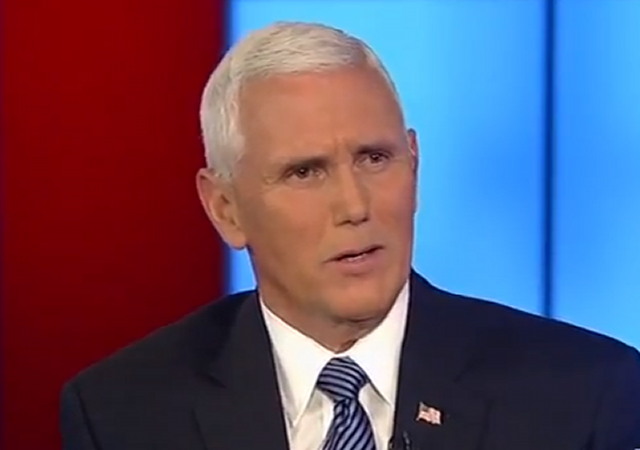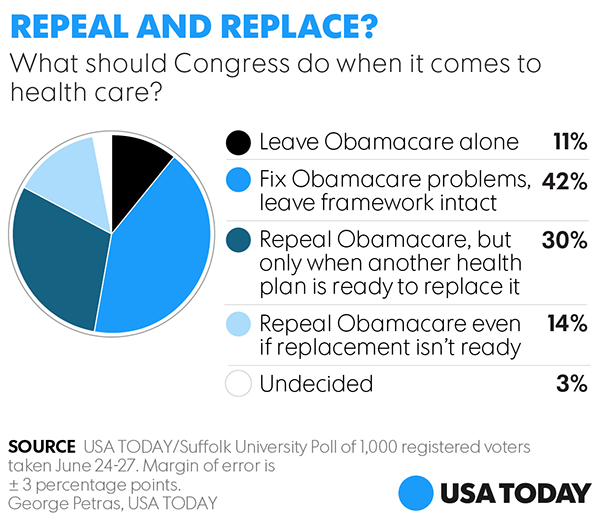The President, the VP, and Americans Agree: Repeal Now, Replace Later (Or Never)

Republicans have gained historic electoral wins across the board in the past eight years, and one of the driving issues behind these victories has been their repeated promise to repeal ObamaCare.
In case anyone’s forgotten, the initial outcry from voters was first to reject and then, once it was passed in the middle of the night, to repeal ObamaCare.
It was the Democrats who started the “what will you replace it with?” narrative. Suddenly, the mantra became “repeal and replace,” but the American public didn’t want ObamaCare. On principle. And we didn’t want it “replaced” with some other central planning disaster.
And we still don’t.
According to a recent USA Today/Suffolk University poll, Americans (still) don’t like ObamaCare, and we don’t like “replacements,” either.
What is confounding to pollsters and to Democrat and Republican pols is that the American public seems confused and divided about the government-controlled health insurance market.
After at least six kabuki votes to repeal ObamaCare while Obama was still president, Congressional Republicans were shockingly unprepared to do as they had long-promised and to repeal ObamaCare. They didn’t even have a plan in mind for repeal or for a replacement because, according to Senator Pat Toomey (R-PA), they didn’t expect President Trump to win.
Now that Trump has won and both the House and the Senate are in Republican control, we are seeing an almost inexplicable lack of understanding of what they are supposed to do, what they were elected to do.
Americans rightly wonder how the GOP can be flailing so horribly on the ObamaCare repeal; to us, it’s clear: you are where you are because you said you’d repeal ObamaCare. Failure on this fundamental issue is unlikely to end well for Republicans.
Yet they still seem wedded to the idea that they just need to find that one mythical, fantastical sweet spot that Americans will accept as a government-controlled health insurance market. That won’t happen.
Indeed, both the President and Vice-president have come to this very conclusion and have said that repealing now without a replacement is preferable to . . . nothing.
Vice President Pence on Monday said congressional Republicans should pass a “repeal only” bill if they can’t come to a consensus on legislation to replace ObamaCare.“If they can’t pass this carefully crafted repeal and replace bill — do those two things simultaneously — we ought to just repeal only,” Pence said in an interview with Rush Limbaugh.Pence’s comments echoed those made by President Trump, who last month suggested that he was open to repealing ObamaCare first and developing a replacement plan later.“If Republican Senators are unable to pass what they are working on now, they should immediately REPEAL, and then REPLACE at a later date!” Trump tweeted on June 30.
What would happen if ObamaCare were repealed? Would Americans eager to spend money on health insurance find no takers? Of course not. Given sufficient notice and freedom from ObamaCare mandates, health insurers would quickly offer coverage to anyone displaced from the failed ObamaCare system.
Mark Levin addresses skittish GOP and their concerns regarding the apocalyptic warnings issued by Democrats.
Conservative Talk radio host Mark Levin debated Fox News host Eric Bolling on whether it would be better for the country and the president if the promised Obamacare repeal was postponed until after Republicans work on tax reform. The segment ran on The Specialists Friday.“Do we see eye to eye on this?” Bolling asked.“No.” Levin answered curtly.“Or do you want to see something passed, Obamacare repeal immediately?” Bolling continued.“I’ll tell you why I disagree with you,” Levin replied. “First of all, why do we keep arguing about health care in the context of what the left argues. Let’s say they repeal it. And they give them twelve months advance notice. What do you think’s gonna happen? Insurance companies are gonna create policies for 20 million people.”“There’ll be new insurance companies that are created,” he explained. “You think they’re gonna leave that money on the table? 20 million people are gonna be on the streets and die in this country? It’ll never happen, we’re a nation of entrepreneurs. That’s number one.”“Number two,” he continued. “Putting it off isn’t gonna fix it. You think they’re just going to easily be able to slash taxes? That’s not gonna happen.”
This is simple, basic logic. The government creates a vacuum, the free market fills it. The free market fills it all the better with freedoms such as allowing Americans to purchase health insurance across state lines, & etc.
Yet there are several factors playing into Republicans’ deer-in-the-headlights inability to function . . . the least of which, as it turns out, is that ObamaCare was passed in a novel way and that parts of it are untouchable without a supermajority to override Democrat objections.
One factor is the GOP buy-in to the Democrat-framed, false syllogism-based narrative that people like parts of ObamaCare; therefore, they must like government control of health care.
When surveyed, people do indeed support coverage for pre-existing conditions, “children” staying on their parents’ policies until they are 26, and other aspects of ObamaCare. However, when asked specifically if they support this coverage being funded by their paying higher taxes, the support craters (which is why the myriad new taxes on the middle classes were buried in the ObamaCare monstrosity).
This apparent disconnect confounds Democrats (and some Republicans). How, they wonder, can voters support one thing (say, pre-existing condition coverage) but not support the higher premiums, higher deductibles, and the limited health care choices that go along with it?
How, they wonder, can they support government control without wanting to be controlled by government?
And there’s the rub.
A Washington Post op-ed by Gary Abernathy, publisher and editor of the (Hillsboro, Ohio) Times-Gazette, pinpoints the problem:
Passing a plan that hurts rural communities through Medicaid cutbacks is a risk. But for many GOP lawmakers, not repealing Obamacare is a bigger risk among voters in those same communities, where Trump reigns supreme and where people don’t look to the government to solve all their problems.That there are such people is what a lot of folks in Washington have trouble understanding. The campaign by the Democrats and many in the media to save Obamacare relies largely on dire warnings about how many people will lose health-care coverage under the GOP plan. They wonder: How can Trump’s supporters stick with him when his proposals hurt them the most?What they fail to grasp is that Trump’s supporters, by and large, are more dedicated to the principle of freedom from government mandates than they are worried about the loss of government subsidies or programs that social activists in Washington think they need.Until Democrats can figure that out, their efforts to pry Trump’s supporters away from him — on health care or any other subject — will continue to be an endless source of frustration.
Abernathy nails it. When progressives bemoan the “fact” that non-coastal, non-urban, non-leftist Americans “vote against their own best interests,” they fail to see that America is still the land of the free and the home of the brave.
It’s easy to ask if you support health insurance coverage for pre-existing conditions, but try asking if people support health insurance coverage for pre-existing conditions in exchange for their freedom from government control of their health care choices. That’s a no-brainer for most people, and it’s exactly why Americans, even those currently dependent on ObamaCare, want it gone. Not replaced. Gone.
CLICK HERE FOR FULL VERSION OF THIS STORY
